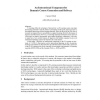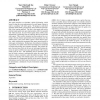415 search results - page 42 / 83 » Individual learning of coordination knowledge |
JCAL
2010
13 years 2 months ago
2010
Abstract The modality learning effect proposes that learning is enhanced when information is presented in both the visual and the auditory domains (e.g. pictures and spoken informa...
BXML
2003
13 years 9 months ago
2003
: E-Learning offers the advantage of interactivity: an E-Learning system can adapt the learning materials to suit the learner’s personality and his goals, and it can react to the...
UM
2007
Springer
14 years 1 months ago
2007
Springer
Accurately recognizing users’ affective states could contribute to more productive and enjoyable interactions, particularly for task-oriented learning environments. In addition t...
AISADM
2007
Springer
14 years 1 months ago
2007
Springer
We believe that intelligent information agents will represent their users interest in electronic marketplaces and other forums to trade, exchange, share, identify, and locate goods...
ATAL
2010
Springer
13 years 8 months ago
2010
Springer
This paper describes an algorithm, called CQ-learning, which learns to adapt the state representation for multi-agent systems in order to coordinate with other agents. We propose ...


